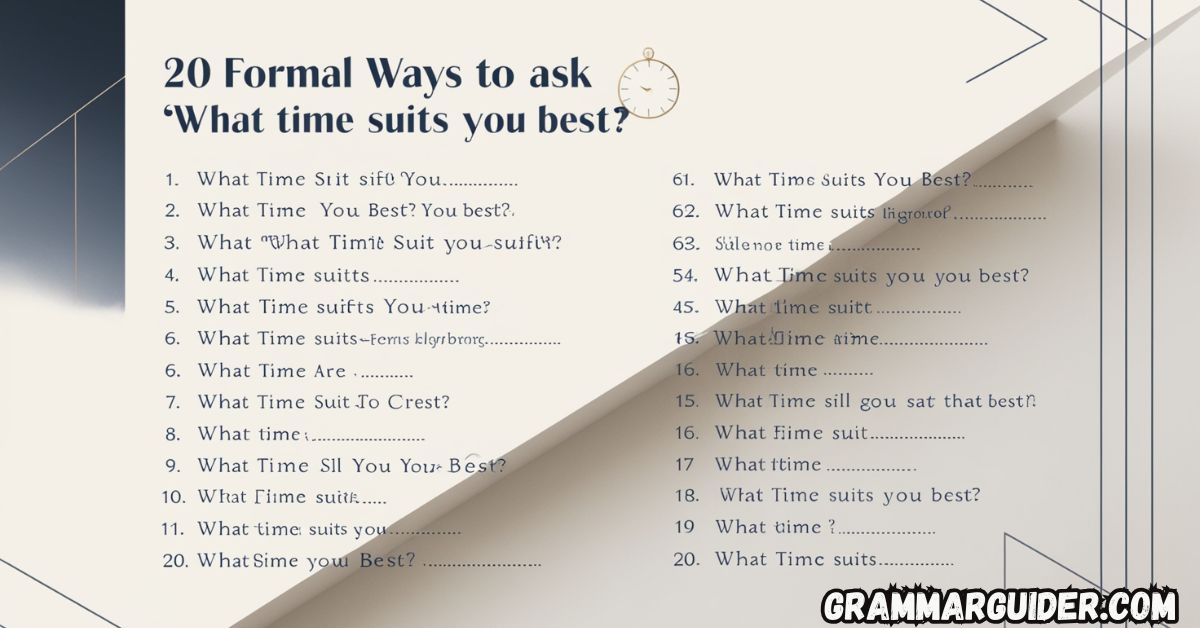In both professional and personal settings, understanding how to phrase requests politely and clearly is a vital skill. One common question that often arises is asking someone when they are available. The phrase “What time suits you best?” is frequently used, but there are numerous variations that can add nuance and formality to your communication. Below are 20 formal ways to ask “What time suits you best?” in different scenarios, complete with examples of how they could be used in emails and conversations.
1. “When would be a convenient time for you?”
This is a classic, formal way to inquire about availability. It conveys respect for the recipient’s time and prioritizes their convenience. It can be used in business meetings or personal contexts.
Example:
Subject: Meeting Request
Dear Mr. Smith,
I hope you are doing well. I would like to schedule a meeting with you regarding the upcoming project. When would be a convenient time for you to meet? Please let me know your availability.
Best regards,
John Doe
2. “At your earliest convenience, could you let me know when you are free?”
This phrase is perfect for professional emails, offering politeness while still being direct. It gives the recipient the freedom to reply when it is most suitable for them.
Example:
Subject: Request for Meeting Time
Dear Ms. Anderson,
I hope this message finds you well. I would appreciate it if you could kindly let me know at your earliest convenience when you are free for a brief meeting. I am happy to adjust my schedule to accommodate yours.
Thank you in advance,
Mark Johnson
3. “Could you kindly inform me of a time that works for you?”
This formal approach is polite and demonstrates deference to the other person’s schedule. It is a great option for initial contact or a more professional tone.
Example:
Subject: Scheduling a Call
Dear Dr. Williams,
I hope you are doing well. I would like to schedule a call to discuss our partnership proposal. Could you kindly inform me of a time that works for you? I’ll do my best to adjust accordingly.
Best regards,
Sophia Martinez
4. “Please let me know what time would be most suitable for you.”
This phrase is simple but formal, ideal for a professional email where you want to avoid sounding too casual. It is also very clear and easy to understand.
Example:
Subject: Meeting Inquiry
Dear Mr. Brown,
I hope you are well. I am hoping we can meet sometime this week. Please let me know what time would be most suitable for you, and I’ll ensure I’m available.
Sincerely,
Emma Green
5. “What would be a good time for you to meet?”
A slightly more casual yet still polite way of asking the same thing. It’s suitable for emails or conversations where a formal tone is maintained, but a slight relaxation is acceptable.
Example:
Subject: Availability for Discussion
Dear Mr. Lee,
I hope you are having a great day. I wanted to check in and see if we could arrange a time to discuss the project. What would be a good time for you to meet? Please let me know, and I’ll work to accommodate.
Best,
James Ford
6. “When might you have time to meet?”
This is a slightly more indirect approach that still asks directly for availability, perfect for professional settings where respect and politeness are paramount.
Example:
Subject: Request for Meeting
Dear Mrs. Taylor,
I hope this email finds you well. I would like to arrange a meeting to go over some details. When might you have time to meet? Please let me know your preferred time.
Warm regards,
Daniel Harris
7. “Could you suggest a time that would be convenient for you?”
This is another courteous approach, asking the recipient to propose a time that suits their schedule. It’s a good choice for establishing a respectful and polite tone.
Example:
Subject: Scheduling a Meeting
Dear Ms. Robinson,
I hope everything is going well on your end. I wanted to discuss the upcoming presentation. Could you suggest a time that would be convenient for you? I am flexible and can adjust to your availability.
Kind regards,
Laura White
8. “Would it be possible for you to let me know when you would be free?”
This formal variation offers a more respectful approach by recognizing that the other person’s time is valuable.
Example:
Subject: Request for Meeting Time
Dear Mr. Garcia,
I hope you are doing well. I wanted to schedule a meeting to review the current progress. Would it be possible for you to let me know when you would be free? I would be happy to fit into your schedule.
Best regards,
Oliver Black
9. “I would be grateful if you could let me know when you’re available.”
This version emphasizes gratitude, which is often appreciated in both professional and personal settings. It’s also very polite and formal.
Example:
Subject: Request to Arrange a Meeting
Dear Ms. Carter,
Hope this message finds you well. would like to schedule a time to discuss our upcoming plans. I would be grateful if you could let me know when you’re available for a quick meeting.
Thank you,
Megan Scott
10. “Could you please indicate a time that suits you?”
A more formal and neutral option that clearly requests a suitable time, offering the recipient flexibility.
Example:
Subject: Scheduling a Meeting
Dear Mr. Miller,
I trust you are doing well. I would appreciate it if you could please indicate a time that suits you for our upcoming discussion. Am flexible with my availability and can adjust as needed.
Kind regards,
John Adams
11. “I would like to find a time that works well for you.”
This variation is suitable when trying to show flexibility while still being polite. It makes it clear that you value the other person’s time.
Example:
Subject: Meeting Time Inquiry
Dear Dr. Nguyen,
I hope you’re having a wonderful week. I’d like to schedule a meeting to discuss the upcoming conference. I would like to find a time that works well for you. Please let me know your availability.
Best regards,
David Kim
12. “Please let me know when would be the best time to connect.”
This is particularly useful when you are looking to set up a call or virtual meeting. It’s formal and clear but also provides an opportunity for flexibility.
Example:
Subject: Call Scheduling
Dear Ms. Thompson,
I hope all is well. I am hoping we could find a time to discuss the new initiative. Please let me know when would be the best time to connect, and I’ll make myself available.
Sincerely,
Isabella Wilson
13. “Would you be able to share a time that suits you?”
This option is polite, asking for the recipient’s preference in a respectful way. It is formal enough for professional communication but can also work for semi-formal situations.
Example:
Subject: Availability for Meeting
Dear Mr. Evans,
I hope you are well. I would like to schedule some time to go over the new business proposal. Would you be able to share a time that suits you? Please let me know what works best for your schedule.
Best regards,
Claire Lewis
14. “Please let me know when you would be available.”
This straightforward and polite option can be used in emails or even formal conversations when asking for someone’s availability.
Example:
Subject: Request for a Meeting Time
Dear Mrs. Cooper,
I hope you’re doing well. I wanted to ask when you would be available to meet about the new policy changes. Please let me know your preferred times.
Warm regards,
Andrew Parker
15. “I’d appreciate your feedback on a suitable time for us to meet.”
This version expresses appreciation for the recipient’s time and politely asks for their input on scheduling.
Example:
Subject: Setting Up a Meeting
Dear Dr. Harris,
I hope you are doing well. I wanted to see if we could arrange a time to discuss the research project. I’d appreciate your feedback on a suitable time for us to meet. Please let me know when works for you.
Best regards,
Anna Green
16. “What time would you suggest for our meeting?”
This version allows the recipient to take the lead in selecting the time, making it clear that you are flexible.
Example:
Subject: Scheduling Discussion
Dear Mr. Mitchell,
I hope this message finds you well. I’d like to arrange a time for us to discuss the upcoming marketing campaign. What time would you suggest for our meeting? Please let me know what suits you best.
Best regards,
Ella Thompson
17. “Could you let me know a suitable time for you?”
A shorter version, but still polite and formal, this request respects the other person’s time and preferences.
Example:
Subject: Request for Meeting
Dear Mrs. Nelson,
I hope you’re well. I would like to schedule a meeting to discuss the quarterly review. Could you let me know a suitable time for you? I am happy to accommodate your schedule.
Kind regards,
Benjamin Walker
18. “Would it be possible to coordinate a time that fits into your schedule?”
This polite option highlights your willingness to adapt to the other person’s availability.
Example:
Subject: Coordination for Meeting
Dear Ms. Garcia,
I hope you’re doing well. I’m hoping we can arrange a time to go over the contract details. Would it be possible to coordinate a time that fits into your schedule? Please let me know.
Sincerely,
Isabella Brooks
19. “Please let me know when you are free to meet.”
A simple and polite request that is slightly more informal than some of the other options, yet still respectful.
Example:
Subject: Availability Request
Dear Mr. Turner,
I hope all is well. I’m hoping to meet with you soon regarding the new project proposal. Please let me know when you are free to meet, and I’ll make sure to accommodate your schedule.
Best regards,
Charlotte Moore
20. “When would you have the time to discuss this matter?”
This is a more direct yet still respectful request for a suitable time. It conveys urgency while maintaining a professional tone.
Example:
Subject: Urgent Meeting Request
Dear Dr. Lee,
I hope this email finds you well. We need to discuss a few pressing matters concerning the current project. When would you have the time to discuss this matter? I’m available at your convenience.
Best regards,
Liam Reed
Each of these 20 formal ways to ask “What time suits you best?” can be adapted to suit your needs, whether you’re drafting a professional email, setting up a meeting, or simply trying to respect the other person’s time. By using one of these phrases, you’re conveying both professionalism and politeness while making it clear that you value the other person’s availability.
Conclusion
In any professional or personal setting, the way you ask about someone’s availability can greatly impact the tone of your communication. Asking “What time suits you best?” may be simple, but there are many formal and polite ways to phrase this question to ensure you sound respectful and considerate. Whether you’re sending a quick email to schedule a meeting or setting up a conference call, the right choice of words can help you maintain professionalism while accommodating the other person’s schedule.
From phrases like “When would be a convenient time for you?” to “Could you kindly inform me of a time that works for you?”, there are many alternatives you can use depending on the context and your relationship with the recipient. Remember, the goal is to be flexible and show appreciation for the other person’s time while still achieving your objective.

Harley Rose is a seasoned expert in English grammar and writing tips, blending years of knowledge and a love for language into her work. With a sharp eye for detail and a talent for making grammar accessible, Harley shares practical insights that help readers write with precision and flair. Her content is ideal for anyone looking to strengthen their writing skills and express themselves with confidence.

